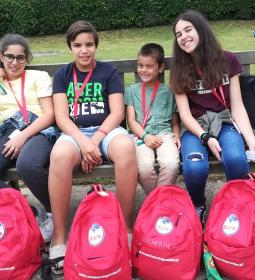Do you dream of studying abroad, but are on a budget? Then consider scholarship and grant programs for education. In this article, we will explain where to look for them.

Websites of cultural and diplomatic centers
The websites of cultural representations of different countries are a real treasure trove of useful information: they contain detailed instructions, deadlines, links to forms and often hold free consultations:
- United States — Education USA,
- British Council,
- France - Campus France,
- Germany – DAAD,
- Netherlands - Nuffic Neso,
- Japan - Japan Foundation.
If suddenly the representative office of your "dream" does not turn out, go to the embassy website.
- For example, the Israeli Ministry of Foreign Affairs scholarship is suitable for those who want to spend one academic year in the country, immerse themselves in research work, or even just attend language courses. The main thing is to be enrolled in the university in advance.
- The Icelandic government provides the Icelandic Government Scholarships, covering all the costs of learning Icelandic, and provides another 130 thousand kroner per month for living.
- The Chinese Government Scholarship program gives you a chance to learn Chinese for free and immerse yourself in science: it is a full coverage of housing, medicine, and education.

Why should you start with such organizations? Their grants are often government-owned, which means near-ideal conditions for you: full funding, minimal bureaucracy, and a real chance of success.
Foundations – Public and Private
There are a lot of foundations: there are those specializing in certain areas, and there are those who look more broadly, but in any case, their main mission is to support talented and motivated students.
- The Open Society Foundations regularly issues large grants for students in various fields.
- The OPEC Foundation actively helps students from developing countries, focusing on talented young people.
What can you say about private foundations? For example, the Allan & Nesta Ferguson Foundation sponsors master's studies at the University of Sheffield (UK). The main requirement for applicants is to convince the commission that your project will be useful for society.
Large companies – look for grants closer to your profession
Did you know that many giant corporations are as interested in educated personnel as universities are?
- UNESCO-L'Oréal finances projects for women in science (especially in chemistry, physics and medicine),
- IBM University Awards: if you are a specialist in engineering technology and IT, this grant can cover not only education, but also health insurance,
- Google Europe Scholarship is a company focused on IT students with disabilities, ready to pay them a scholarship of 7,000 euros.
Another tip: such opportunities are rarely talked about openly, but at specialized conferences or while communicating with company representatives, you can get the latest information. Prepare a portfolio, argue the need for a grant, and success will not be long in coming!
Government Subsidies
Scholarships and grants are great, but in the world of financial support, it doesn't end there. States provide subsidies for housing, medicine, and transport. Want to give it a try? Consider the opportunities offered by programs such as ISIC (International Student Card): it gives you access to discounts on airline tickets, museums, theaters.
Websites of the universities themselves
This is one of the most obvious, but for some reason often overlooked options. Every self-respecting university has sections like Scholarships or Financial Aid. For example:
- The University of Melbourne (Australia) offers more than 600 funding options,
- The University of Hamburg (Germany) gives grants to all international students without exception.
The key here is to look beyond the usual academic scholarships. Leadership, creative, and sports grants are also a great chance to ease the financial burden.
What if the grant is not enough?
Have you won the financing but the amount does not cover the costs? There is a solution:
- Summation of grants. A partial grant can be supplemented with another program — the main thing is that the conditions of each of them allow it.
- Work. Many countries allow students to work part-time: for example, in Germany, you can work 20 hours a week and thus receive from 400 to 600 euros per month.
- Savings. Be open to "economical" options: dormitories, cycling instead of public transport, free museums on weekends, specific student discounts (from catering to laundries, hairdressers, and bike rentals).









